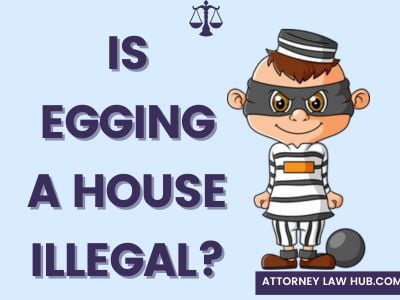Yes, egging a house is generally illegal. Because egging a house involves violence or property damage, it is usually regarded as illegal.
The intentional destruction or defacement of another person’s property is known as vandalism. In this instance, throwing eggs at someone’s house results in property damage. This damage may take the form of stains on the house’s exterior, which can be challenging to clean, or it may even inflict more serious damage like breaking windows, destroying paint, or detracting from the property’s overall look.
“Is egging a house illegal? Sometimes, the line between a prank and a crime is thinner than we think.”
by Attorney Law Hub
Egging a house is prohibited in order to safeguard individuals’ property rights and promote a sense of safety and security in neighborhoods. Neighbor disputes and a sense of insecurity can result from people doing acts that cause harm or vandalism to other people’s homes.
Laws that discourage similar behavior and punish offenders are in place to stop these problems. Depending on the level of damage and local laws, the exact punishments for egging a house can change, although they frequently involve fines, community service, or even criminal prosecution.
Thus, it’s imperative to respect other people’s property and abstain from actions that can put you in hot water legally.
Egging someone’s house
Egging someone’s house is careless and destructive behavior. It entails throwing eggs at someone’s house, frequently resulting in mess and destruction. Even if it seems like a joke, you should be aware of the potential implications.

It is important to understand that smashing into someone’s home with an egg is not a lighthearted joke. Eggshells and yolks have the potential to discolor and even damage materials such as paint, wood, and siding, causing harm to property. It can take a lot of money and time to clean up the mess.
And it’s not only about harm to property, either. The homeowner may experience emotional discomfort as a result of egging. Imagine waking up to discover that someone has vandalized your home. This may be quite distressing and cause feelings of unease and invasion.
Furthermore, egging is not allowed in several locations. If caught in the act, there might be fines, community service, or even criminal penalties. A criminal record may have long-term effects, influencing prospects for employment or college admissions in the future.
Is egging someone’s house illegal?
Since egging someone’s home is considered a form of vandalism or property destruction, it is usually prohibited. The magnitude of the harm and local regulations are two examples of parameters that may affect how serious the legal implications are. Here are a few crucial details:
Property Damage:
Eggs can inflict a variety of damages when they are thrown at a house. Paint can be scratched or chipped by eggshells, and surfaces can get stained by egg yolks if they aren’t wiped right away. Sometimes the damage calls for expensive repainting or repairs.
Legal Repercussions:
Anyone found to be egging a residence may be charged with criminal chaos, vandalism, or even theft. Penalties for these offenses may include fines, probation, community work, or, in extreme circumstances, jail time. A criminal record can negatively affect a person’s life for a long time, impacting relationships and employment prospects in the future.
Emotional Impact:
It’s important to take into consideration the emotional impact on the homeowner in addition to the potential legal consequences and material damage. It can be upsetting to discover that your property has been vandalized; this can leave you feeling violated and uneasy. Such events may cause emotional wounds that endure a lifetime.
Community and social norms:
In most communities, it is considered improper to plant eggs in someone’s home. Neighbours may come to distrust those responsible, and relationships and reputations may suffer as a result.
Better Alternatives:
Rather than pulling hurtful jokes on others, it’s critical to discover more constructive and lawful ways to enjoy yourself with friends. It is preferable to take part in community-building activities that foster kindness and respect.
What should I do if my house is egged?

Take the following steps if your home has been egged:
Call the police:
Reporting the occurrence and making a phone call to the police is the first and most important step. Give them as much detail as you can, such as the incident’s date and time, any descriptions of the people involved, and whether any witnesses were there.
Record the scene:
Snap pictures of any damage done as well as the egged areas. This proof is essential for making insurance claims and, if required, bringing legal action.
Handle with Care:
Egg whites and shells can be ugly and cause harm to your belongings. As soon as possible, clean up, but take care not to scratch or harm surfaces anymore. To carefully clean the afflicted regions, use warm, soapy water and a soft cloth.
Look for additional damage:
Examine your property for any additional damage, including cracked windows or chipped paint, that may have resulted from the egging. Also, record these damages.
Notify Your Neighbors:
Find out whether your neighbors saw the incident or if it also had an impact on their property by having a conversation with them. Their testimonies can be beneficial to the police inquiry.
Contact your insurance company:
Report the occurrence and give your homeowner’s insurance company the evidence you’ve gathered if there is any major damage.
Protect Your Property:
To prevent similar events in the future, think about enhancing security measures such as adding motion-activated lighting or security cameras.
What can the police do if someone eggs your house?
The police have various options for handling an egg-throwing incident at your home. They could:
Evidence Gathering:
Before doing anything else, police will gather evidence like eggshells, pictures of the damage, and any security camera footage that might have shown the occurrence. This evidence is essential for any further research project.
Interviewing Witnesses:
The police may speak with any witnesses, including nearby residents, about the egging. Their statements can be useful in determining the offender and figuring out the situation.
Finding the Culprit:
If someone is suspected of being the culprit, the police will speak with them to get their viewpoint on the events. They can inquire as to whether it was intended as a joke or whether there was another reason.
Examining Similarities:
In the event that previous egging instances have happened in your neighborhood or nearby, the police may investigate potential trends or linkages. This can help determine whether it’s a singular incident or a component of a more serious problem.
Legal Action:
The individual in question may be charged with a crime, depending on the circumstances of the incident and the applicable local laws. Charges for criminal mischief, vandalism, or property damage may be brought.
Compensation:
The process of obtaining compensation from the offending party may be assisted by the police. This implies that the offending party can be required to pay you for the harm done to your property.
Community Settlement:
If all parties are willing and the incident is minor, the police may mediate a settlement through a community mediation process. Without using the legal system, this may result in an agreement to pay damages, issue an apology, or take other non-judicial action.
As part of the inquiry, you must assist the authorities and maintain documentation of any losses or costs associated with the egging incident. An efficient police response can be facilitated by promptly reporting the occurrence and offering as much information as you can.
What legal consequences can someone face for egging a house?
You can definitely prosecute the offender for a crime if they break into your home. Depending on the regulations in your jurisdiction and the severity of the damage, the exact charges and penalties may change. In general, property damage or vandalism are terms used to describe the act of egging a house.
Legal consequences for the culprit of this conduct could include fines, probation, community service, or even jail time, particularly if the egging resulted in serious harm or was a part of a harassment pattern. Criminal charges can come with heavy costs, from possible legal bills if an attorney is required to help you through the court system to fines that could total $100 or even $1,000.
In addition, in the event that your home has been damaged, you might be able to recoup some of the costs by filing a lawsuit or by making restitution as part of the criminal prosecution. To start the legal procedure and pursue justice, it is crucial to report such incidents to law enforcement as soon as possible.
Can I get arrested for egging a house?
Yes, you can potentially get arrested for egging a house. Egging a house is usually seen as a criminal offense in most jurisdictions since it is an act of destruction or property damage.
Criminal charges may be brought by the police once they look into such situations and determine who is at fault. The magnitude of the harm and local regulations can affect how severe the consequences are. Significant damage increases the likelihood that the offender may be subject to legal repercussions, which may include fines, community service, probation, or even a jail term.
It’s important to understand that participating in activities like egging houses may result in criminal charges. For this reason, it’s advisable to stay away from such activities and look for other constructive methods to express yourself or have fun.
Conclusion
In conclusion, since egging a house is considered theft or harm to assets, it is forbidden in most countries. Depending on the severity of the harm and local regulations, the penalties could be anything from fines to criminal prosecutions.
In addition to the implications for the law, such acts may cause the homeowner considerable grief and sour relations with the neighborhood.
Efficient resolution of an egged house can be achieved by reporting the incident to the police as soon as possible, keeping track of the damage, and following the correct protocols.




